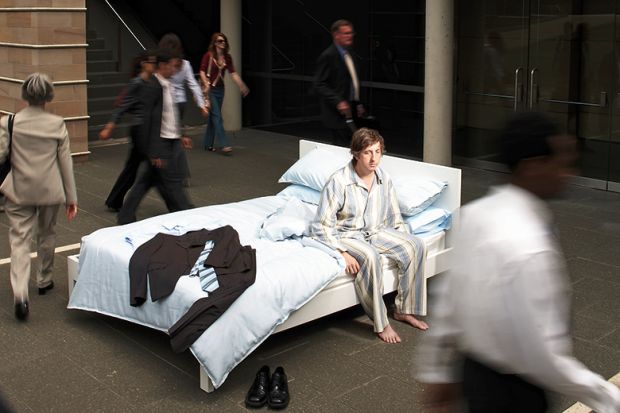Growing numbers of UK universities are pushing their teaching hours into the evening to cope with bulging student enrolments, raising concerns about the impact on the family lives of teaching staff.
In the latest case, academics at Lancaster University expressed concern about plans to extend classes to 7pm. The local branch of the University and College Union said that the proposal raised “serious issues” relating to “equality, health and safety”.
Lancaster subsequently said that the extension of the teaching day to 7pm on Mondays, Tuesdays, Thursdays and Fridays was a “pilot scheme” that was “likely to be focused on a small number of departments”. The move would “increase availability of our large lecture theatres”, a spokeswoman said.
However, a snap survey by Times Higher Education has revealed that Lancaster is by no means the only university extending its working day beyond the traditional 5pm or 6pm.
Core teaching hours at Brunel University London are 9am to 8pm five days a week, something that is “necessary not only to ensure a sufficient number of large lecture space hours, but to enable the complexities of shared modules and programme structures”, a university policy says.
Oxford Brookes University’s lectures run until 8pm from Monday to Thursday, and classes at the University of Chester continue until 7.30pm on Mondays, Tuesdays and Thursdays.
Teaching ends at 7pm on those days at the universities of Birmingham and Hertfordshire and Canterbury Christ Church University, while the University of Gloucestershire has a 7.15pm finish.
Academics have warned that more institutions are likely to follow suit as they bid to increase their tuition fee revenue without breaking the bank on new lecture theatres or more teaching staff.
“With more students coming in, but less space and less money for more building, we’ll have these kind of timetabling problems unless we think creatively about how we deliver education to students,” said Sir Cary Cooper, 50th anniversary professor of organisational psychology and health at the University of Manchester.
Sir Cary added that working later was “not good” for the health of employees. “Universities are supposed to be into well-being and work-life balance, but work-life balance already scores out badly in university surveys,” he said.
Roger Seifert, professor of human resource management and industrial relations at the University of Wolverhampton, said that extending hours was “in every possible way, a bad idea”.
“For undergraduate students, all evidence shows that attendance at later lectures will be low, as will be their ability to concentrate and take in the information,” Professor Seifert said. “It's also a refusal to appoint more lecturers, which is absolutely necessary. Vice-chancellors who lobbied for student fee increases said that it would lead to more lecturers and better pay but this is the exact opposite of that.”
Gregor Gall, a former professor of industrial relations at the University of Bradford who is now an affiliate research associate at the University of Glasgow, warned that female lecturers would be particularly adversely affected.
“This raises a number of contractual issues, whether or not it is voluntary or whether people would get time off in lieu for working later,” he said. “One particular problem will be for those who have childcare responsibilities, and unfortunately this responsibility still falls largely on women’s shoulders.
“A lot of people working 9am to 5pm or 9am to 6pm would expect to be able to get home to be with their kids.”
The situation in the UK contrasts with Australia, where core teaching hours at many universities already extend to 9pm or 10pm. This is a longer-standing arrangement designed to meet the needs of working and mature-aged students, and the main pressure point in the country is some institutions’ move to expand the number of teaching weeks each year by adopting a trimester system.
A Lancaster spokeswoman said that student numbers at the institution “are increasing year on year and we are making significant investment in our campus to provide additional lecture theatres and other teaching-related spaces”.
“However, a combination of key factors such as differences in student expansion across subjects, increased demand for larger lecture theatres and larger cohorts on key modules means there is pressure on our current teaching timetable – which is likely to remain until new facilities are built,” she said.
The spokeswoman added that Lancaster “remains committed to promoting equality, diversity and inclusion in work and in study”.
“We hope that an extended teaching day will offer some staff additional flexibility in their working arrangements and, where working schedules or personal commitments need to be adjusted, these will be considered sensitively and in line with our existing family-friendly policies,” she said.
An Oxford Brookes spokeswoman said that the university had “historically” taught courses in the evening, “in recognition of the fact that not all students will want or be able to study from 9am to 5pm”.
“The university is not at full teaching capacity during its scheduled academic contact hours and timetables are carefully crafted within the standard teaching hours framework,” the spokeswoman said.
POSTSCRIPT:
Print headline: Late-night lectures stretch staff to the limit
Register to continue
Why register?
- Registration is free and only takes a moment
- Once registered, you can read 3 articles a month
- Sign up for our newsletter
Subscribe
Or subscribe for unlimited access to:
- Unlimited access to news, views, insights & reviews
- Digital editions
- Digital access to THE’s university and college rankings analysis
Already registered or a current subscriber?








